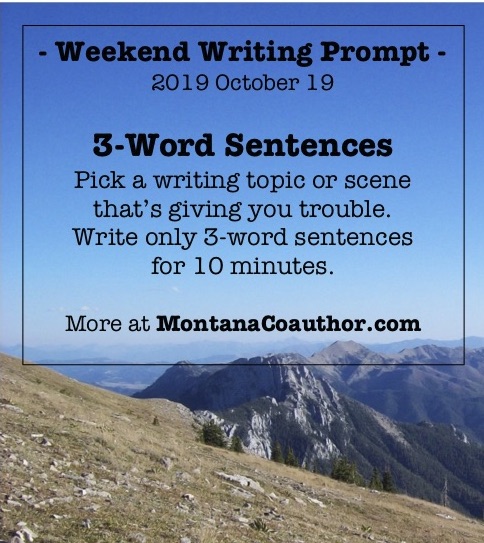This weekend’s writing prompt was “Three-Word Sentences.” Simple instructions: Pick a topic. Set a timer for 10 minutes. Write only 3-word sentences. I’ve seen this prompt at numerous writing workshops and always love it.
It starts as a warm-up. Anyone can write a 3-word sentence, right? No pressure. Super easy. But two minutes in, the tone shifts. The sentences might begin to feel brusque, hard edged. I want this. I hate that. I hope this. I fear that. Subject, verb, object. That’s the limit of the form. Many writers cheat at this point. We write a six-word sentence but break it in half with a period. For dramatic effect. That’s okay. This is about loosening up your creativity, so it’s fine to use the prompt creatively.
I had some surprises when I tapped into this prompt. I used it to unblock on a fiction scene that has felt necessary but undefined for months.
Here’s the scenario: A hard luck case named Linden shows up on the doorstep of an older woman who’s been reclusive ever since her husband passed away four years ago. Gerti has survived some exceptionally hard times too, but that was decades ago. She’s tired of spending her compassion on others, and for all her time spent alone, she hasn’t really taken any time to heal from her own recent loss. She does decide to hire Linden, giving the young woman a summer job cleaning up the landscaping in exchange for a caretaker’s apartment. A week into this gig, it’s clear Gerti’s patience is wearing thin.
I want to write a scene that shows Gerti watching Linden from a distance and coming to some harsh conclusions. But frankly, I couldn’t tell what Gerti was about. I used “Three-word Sentences” to interview Gerti and let her speak to me in first-person present-tense about this time period in the story.
The result was surprisingly abrasive. Some of these sentences felt like Gerti might shout them at Linden in a rage. Some of them were whimpered in private. In short, Gerti’s super conflicted. That’s good stuff on the page.
Again, this is Gerti explaining herself in first person. Here are some “best-of” scraps from my sketchbook:
Linden works hard. But not smart. She drops tools. She can’t succeed. She is poor. Has little education. She might steal. I see her. Don’t like her. I feel sorry. She is drab. I wonder why. Who hurt her? Where’s her mother? What’s her problem? How to fix? She can’t shovel. She can’t prune. She can’t weed. She needs help. She needs instruction. I’m too tired. I don’t help. Sometimes I help. Sometimes I yell. Can’t stand her. I hate weakness. I fear weakness. I want better. I still hope. But I’m tired. I am spent. I’ve no patience. She’ll break through. On her own. I can’t help. Not her mother. Or her grandmother. Figure it out! Get it right! I had to! You will too! Leave me alone. Do your work. I’ll help later.
Gerti is a hot mess. But a relatable hot mess. She’s incredibly judgmental and condescending, and yet she softens—hinting at where some of that hard edge came from. No one helped her during her toughest years. At least that’s her perception right now. Linden reminds Gerti of her own vulnerability. She hates that feeling, and her irritation with that feeling spills over onto the girl. I’m intrigued now. Hopefully the final scene will convey that sense of curiosity and keep my readers interested too.
FYI, while the scene in the book will be written in third person (She/He/They) and past tense (walked/ran/said), some of these 3-word scraps will definitely make it in. Gerti often talks to herself. Now I’ve got a wealth of snippets she might mutter aloud to her houseplants.
How about you? Did you test drive the prompt? How’d it go? Got a few scraps to share? What worked well? What didn’t?
Share your loves, hates, and “meh’s” in the comments here, or join the wider discussion at my Author Facebook Page. “Like” and Follow that page to get your writing prompts on Fridays!

